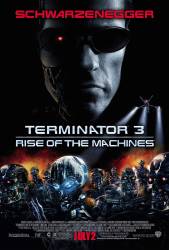Question: In the second Terminator movie, the Terminator says that he can't self-terminate. When the Terminator is trying to defeat T-X, he manages to destroy himself and her in the process. If the Terminator couldn't self-terminate in the second movie, how come the new one could?
Answer: For me, T2 was a lot about machines being able to learn so in T3 when he managed to shut himself down it was because he had learned compassion and not to be just a machine following orders as well as understanding how vital it was that John survived.
Answer: If you listen in the second film, I don't remember if it was cut out of the theatrical film and put back in the extended version or not, John and Terminator are in the desert looking at the guns Terminator says "I have to stay functional until the missions is complete." Once the T1000 is dead Terminator had no other reason to function and thus sacrificed himself. In this film he knows the fuel cell would destroy the TX once that happened his mission was completed and no longer had any real reason to function anyone.
That can't be the case, because by the end of T2 his mission was complete, and he still couldn't self terminate.
Question: Why did John Connor program the Terminator to only obey Catherine's orders? Since he is the boss wouldn't he make it so the Terminator would obey his orders?
Answer: He didn't program the Terminator, she did - remember, John is dead, successfully eliminated by that very Terminator. As to why she didn't program the Terminator to obey both of them, that's an open question - possibly she needed to supply a voiceprint which obviously couldn't be obtained from the deceased John (which would also explain why the Terminator in T2 appeared to only be programmed to obey John, not both John and his mother). Alternatively, it's plausible that the Terminators can only be programmed to obey one individual, in order to prevent problems in the case of conflicting orders.
Question: Can anyone tell me if Edward Furlong was asked to reprise his role as John Connor and why he didn't?
Answer: He was originally in talks - and by some reports, did appear on set for some period of time. While factual answers are in short supply (for obvious reasons), there appears to be a connection to his drug-use habits. For instance, he was checked into a hospital (LA Cedars Sinai) for what friends feared was a drug overdose in April 2001, and has been in and out of rehab over the years. Chances are the production company was unable or unwilling to get completion insurance.
Question: I don't understand the explanation John gives when he says that if the other terminator in T2 hadn't intervened, he would've met Catherine.
Answer: It's another reference to the fact that Judgment Day is inevitable. When they changed/prevented one possible future scenario (T2) they created another (as explained in T3 where they simply delayed Judgment Day). In other words, Catherine's father was always going to be responsible for creating Skynet and the killing of Miles Dyson only "delayed" that scenario. If the events of T2 had not happened, John would have met Catherine sooner and would have met the "real" person behind "Skynet".
Question: Is it true that James Cameron hated this movie?
Answer: A quote from the man himself from a BBC News article in 2003 "Great. There was a small part of me that hoped it wasn't good - but another part of me hope'd it succeeded. And it did. And I'm so glad it did. Jonathon's made a great movie. Arnold's in great form. I really like what he's done with it."
Question: In the second film, the T-800 stated that Skynet launched the nuclear missiles in response to the government trying to shut it down. This is not the case here (as John states that Skynet has little-to-no-chance of being destroyed by conventional means). It just preps launching them as soon as it becomes active. It is not longer motivated by any clear threat to its existence. What, then, causes Skynet to identify humans as the enemy and initiate Judgement Day?
Answer: In this reality (which is subtly altered from the "original" Terminator timeline due to the changes made in T1 and T2) SkyNet became conscious quite a bit before T3 and eventually determined that it should be in control of the world. To pursue that goal, it launched the virus discussed throughout the film which was intended to trick the government into launching SkyNet world-wide. In other words, its new motivation was paternalism/global domination, and humanity (in its current form, anyway) gets in the way.
Question: When the TX tastes a sample of John Connor's blood at Kate's vet clinic she seems stunned. How is this possible on a cyborg and why look so surprised?
Answer: Advanced Terminators occasionally show signs of emotion: T-X also exhibits frustration, anger, and genuine malice, as well as smirking mischievously on two occasions. When she samples John Connor's blood, she's stunned to come across her primary target, whose whereabouts Skynet was unaware of.
Answer: Her goal/duty was to terminate John Connor. She must first find him in order to terminate him. Identifying John's blood - fresh blood, in fact - meant he was nearby and she was getting close to achieving her goal. This excited her. There was a stimulus and response, similar to Pavlov's dogs who salivated when they heard the bell indicating that food was coming.
Question: What make/model of car does the female Terminator steal from the nice lady? It's the scene where she's naked and the woman says "Oh my god, do you need help?"
Answer: The car she takes from the woman is a 2003 Lexus SC 430 Hardtop Convertible($42,000 new).
Question: Whats with the face of the TX when it tasted John Connor's blood in the pet clinic? Excitement? Happiness to find it's target or didn't Kristina like the taste of coagulated blood?
Answer: Since he was the primary target the TX computer was jolted a bit.
Question: What is the name of the music that starts playing in the final trailer just after the narrator says "our last hope will be one of them"? Where can i get the music?
Answer: This is an excellent track called "Gothic Power" by Christopher Field - most famously used in trailers for the Fellowship of the Ring. It can be found here - http://www.slavelakewolves.com/multimedia/gothic_power.mp3.
Question: Did James Cameron ever express how he felt about judgement day occurring at the end of this movie, considering he chose to have nothing to do with this production.
Answer: James Cameron has stated in interviews that this film has nothing to do with him. So basically as far as he is concerned, judgement day never happened and life went on as usual. If the makers of T3 felt judgement day should happen, then that is their decision, as it is their film now. James has told his story, others can tell theirs.
Question: Why did Linda Hamilton refuse to appear as Sarah Connor in this movie?
Answer: She read the script and wasn't impressed (which is generally the reason a lot of actors don't return to sequels). In the initial script, Sarah dies part way through, but Hamilton felt her character was more of a background character and the film focused too much on action rather than character development like the previous 2 films. Of course, her ex-husband, James Cameron, dropping out of the original production of the T3 film due to that whole mess also factored into her decision. Had Cameron remained on the project, Hamilton probably would have reprised her role (not to mention how different the film would have been).
Question: Why didn't the terminator obey Kate at their first meeting, when she told the Terminator to let her go?
Answer: Her life was in immediate danger and his primary duty was to protect her. If her command to him jeopardized his mission (which it did), he would prioritize and override her commands until she was out of danger. Stated differently, he did not have to obey her if doing so interfered with his ability to protect her.
Answer: Maybe her future self gave the terminator specific instruction on when to obey her and when not to, particularly regarding her own safety.







Answer: The difference there would be suicide vs sacrifice. In T2, basically what he meant is he could not commit suicide as it was against his programming. They had beat the T-1000 and had won, but it was too dangerous for Terminator to stick around and knew he had to be destroyed. But he could not purposely do it to himself as it was an act of suicide. However in T3, it was a sacrificial move. The goal of his actions was not to destroy himself, it was to take out the TX and prevent her from reaching John. He had to do this by any means necessary and made a sacrifice play by shoving his core into her mouth and blowing them both up. It wasn't suicide this way, it wasn't self termination. He was taking her out but caused himself to be collateral damage.
Quantom X ★
Also, after watching that scene again, I'm adding this little tidbit. The Terminator didn't actually die from the thing he did to the TX in that move. If you notice towards the end after the nuclear bombs go off, the fall out ash is falling down around its head and its eyes are still on, slowly fading away. It was badly damaged by its move, but the bombs in the end finished him off.
Quantom X ★